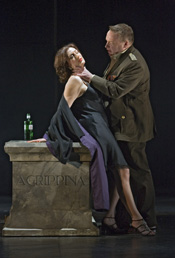09 Feb 2007
HANDEL: Agrippina
An expressionist portrait of the Roman she-wolf was the first, striking image of this production, originally devised for Théâtre Royal de la Monnaie, by the fashionable British director David McVicar.

An expressionist portrait of the Roman she-wolf was the first, striking image of this production, originally devised for Théâtre Royal de la Monnaie, by the fashionable British director David McVicar.
It promised many of McVicar’s trademarks — stark colour, gothic imagery and theatricality.
But despite an emphasis on history and myth, this modern-dress staging of Handel’s tale of politico-sexual manipulation was very much a study of the relationship between women and power in our own time. Between them, Agrippina and Poppea have half of Rome in love with them, and they exploit it with equal deviousness — and yet their relationship with one another is one of superficial friendliness and glacial suspicion.
 In the title role — a strange one, given that the supporting characters seem to be given most of
the best arias — Sarah Connolly’s reliably impeccable musicianship did not disappoint. Her stage
presence was a revelation; used to being cast as men, Connolly projected a regal femininity
which was complemented to best effect by John McFarlane’s glamorous costume designs. She
was partnered by the marvelous Christine Rice as the feckless teenage Nerone, the son who is
destined for the Imperial throne. Rice’s voice and repertoire have expanded hugely in recent
years and I am pleased to note that her grasp of quickfire Handelian coloratura is even more
astonishing now than it was when she sang Bradamante in McVicar’s staging of Alcina seven
years ago.
In the title role — a strange one, given that the supporting characters seem to be given most of
the best arias — Sarah Connolly’s reliably impeccable musicianship did not disappoint. Her stage
presence was a revelation; used to being cast as men, Connolly projected a regal femininity
which was complemented to best effect by John McFarlane’s glamorous costume designs. She
was partnered by the marvelous Christine Rice as the feckless teenage Nerone, the son who is
destined for the Imperial throne. Rice’s voice and repertoire have expanded hugely in recent
years and I am pleased to note that her grasp of quickfire Handelian coloratura is even more
astonishing now than it was when she sang Bradamante in McVicar’s staging of Alcina seven
years ago.
The other shining light in this production was the rising star Lucy Crowe, a relatively late addition to the cast as Poppea, who combined absolute vocal security and assurance with an alluring presence and fine comic timing, especially in the staging’s best judged and most memorable set-piece in which Crowe was joined onstage by harpsichordist Stephen Higgins for a virtuoso “piano-bar” performance.
Making his company début as Ottone, the young countertenor Reno Troilus grew in vocal security and confidence as the performance went on; he gave a touching vocal portrayal of the wronged man’s bewilderment in his aria at the close of the first act. The “character” roles of Pallante and Narciso (Agrippina’s suitors and political pawns) were ably assumed by bass Henry Waddington and countertenor Stephen Wallace.
Despite a few moments of musical untidiness, Daniel Reuss’s conducting was for the most part buoyant and well-balanced.
Unfortunately the concept of the sex, drugs and rock ’n’ roll opera production is now something of a cliché. Despite the considerable comic gifts of McVicar and his cast, the staging exhibited a pervading hint of crassness which I hope is not a sign of things to come for this popular director. Four-letter words littered Amanda Holden’s translation. Much advantage was taken of Crowe’s physique du role; Poppea stripped down to sexy lingerie twice in the space of two scenes, in spite of only one of the occasions making any dramatic sense. Poppea understandably rolled in drunk after her traumatic split from Ottone, but what was the point of Agrippina turning up similarly inebriated a couple of scenes earlier? The opera is all about the relationship between sex and power, but it all seemed a little overdone. Another worrying thing, and surely not the fault of McVicar or the near-perfect cast, was the plentiful supply of empty seats on this opening night of what is surely ENO’s most important new production of the current season.
Ruth Elleson